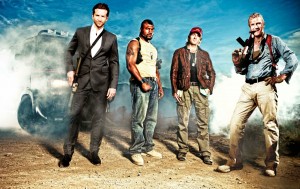This flick was my first time at an honest to goodness press screening. Not going to lie, it was pretty great. I could do that often and have no complaints.
I Am Love will be one of the best films of the year that no one will watch. It has a lot going against it, Oscar-winning lead Tilda Swinton or no. It’s entirely in Italian (Swinton learned to speak the language with a character-specific Russian accent). It’s a two-hour hard drama, devoid of levity, and North American censors are notoriously squeamish when it comes to shots of female genitalia. Yes, shots — plural. It’s this abandon and seeming disregard for North American box office take that makes I Am Love not only a shocking achievement, but one of the most fearless dramatic films in years.
The film tells the story of Emma Recchi, an immigrant inductee into the powerful Recchi family of Italian aristocrats. Embarrassingly wealthy owing to a thriving textile concern, the film apes Tennessee Williams and joins them celebrating the birthday of the family patriarch who finds himself approaching death. While at this point it could easily devolve into a straightforward heir battle, the thread of the family’s future only serves as a frame to describe a situation where Swinton’s Emma will never belong. As her utility to her husband ends at her uterus, a chance encounter with her son’s chef friend draws her slowly into an affair. It’s a tale of life, death, renewal, and stumbling forward, clothed or not.
Director Luca Guadagnino has put together an impressive package with his biggest production to date. His direction of frequent collaborator Swinton is expertly done, an advantageous situation given that she forms the centre of gravity for the film. There is nearly nothing else in the film. I Am Love hangs its entire being onto her capable, angular shoulders and she responds to the weight expertly. His mastery of shot choice and his clear respect for cinematography makes I Am Love an absolute treat to look at, inspiring an instant desire to catch it again on Blu-ray (an odd trait for such a tense dramatic work). In another life, Guadagnino could direct food commercials: a good portion of this film imbues sensuality into food and cooking. This is a skill that most directors wish they could attach to their love scenes.
The script is incredibly strong, juxtaposing Emma’s lovers expertly. Her husband pointedly clothes her, zipping a dress, and clasping bracelets and other expensive armour, while her lover unwraps her like a present for the world and the audience to see and admire. In an effort to help along her journey into adultery, Emma stalks her prey like Gatsby (that is to say with class, not the creepy kind of stalking). Here, Swinton masterfully introducing a girlish fluster into her encounters. Sub-plots about another unwelcome inductee include her son’s fiancée, and the plans to sell the family business to foreign concerns at the cost of the company’s humanity weave into the narrative with ease. The affair unfolds with shades of Dawson’s Creek, the “will-they or won’t-they†factor becoming stifling right before its logical release (which sets up a hilarious visual gag that may be the film’s only funny moment). The unpredictable pacing of the film — plodding, with sudden octane infusions — suits the unpredictable nature sudden, traumatic family events, and sets up a climax that will knock you flat.
While it has flaws, they are nitpicks at best. A sub-plot regarding Emma’s daughter coming out as homosexual is tainted by the unintentionally hilarious choice she makes to cut her hair short, a cliché obviously meant to compare with her mother’s similar choice upon deciding to divorce her husband. Similarly, Guadagnino’s choice to make the face of the antagonist attempting to purchase and corrupt the family business an American Sikh is a blunt and artless comment on the changing economic and social face of the United Kingdom and the European Union. It’s a vaguely racist moment that comes from nearly nowhere. Combine those with what amounts to a huge amount of “Italy porn†— lavish shots boasting the natural beauty of the Italian landscape — and it results in comparatively minor gripes about a solid film.
I Am Love will have nearly no domestic impact commercially, but will continue the Oscar tradition of populating the “Best Foreign Film†category with some of the best work no one cares about until they get a statue. Swinton keeps marching quietly forward in her campaign to be regarded as one of the best actresses of her time with this challenging, awe-inspiring work she carries effortlessly. If she hasn’t already earned a star on the Walk of Fame, this will probably do it.
Comments Off on Review – I Am Love
